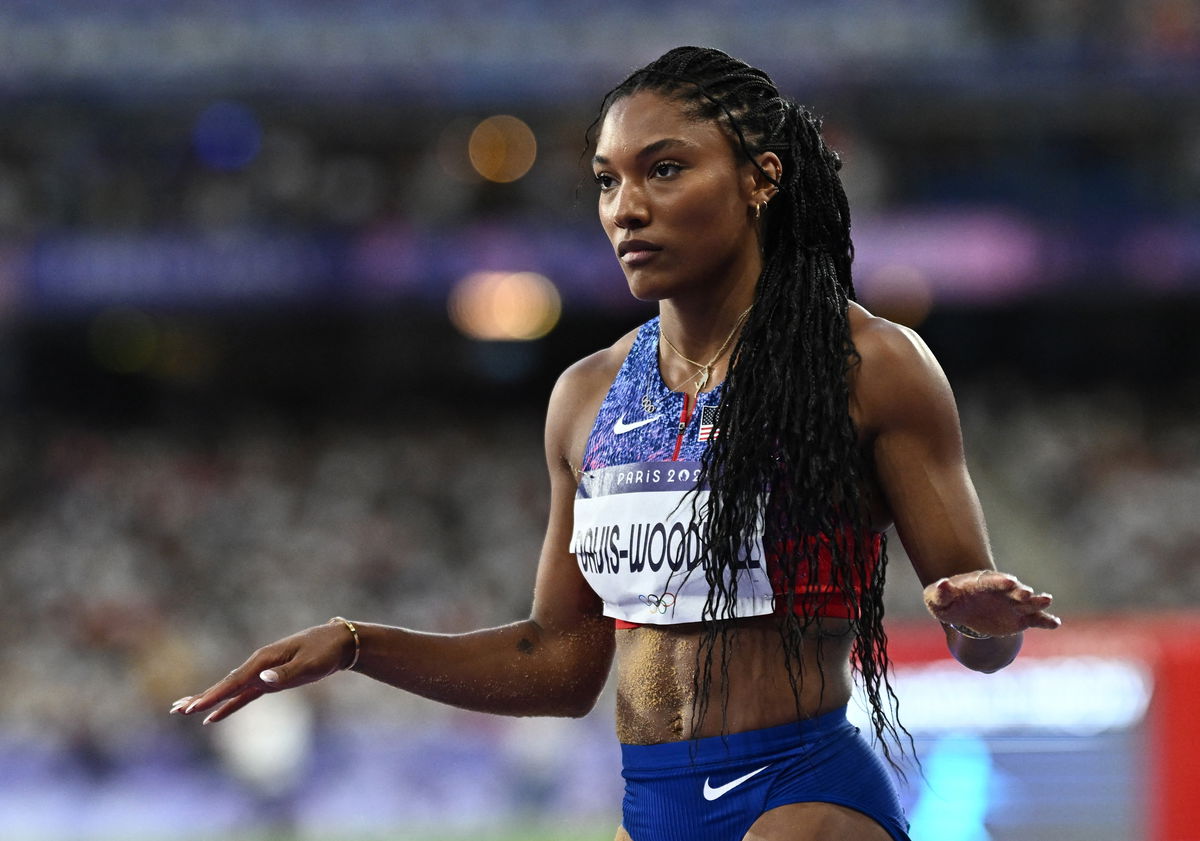
Reuters
Paris 2024 Olympics – Athletics – Women’s Long Jump Final – Stade de France, Saint-Denis, France – August 08, 2024. Tara Davis-Woodhall of United States reacts. REUTERS/Dylan Martinez

Reuters
Paris 2024 Olympics – Athletics – Women’s Long Jump Final – Stade de France, Saint-Denis, France – August 08, 2024. Tara Davis-Woodhall of United States reacts. REUTERS/Dylan Martinez
The war to uplift track and field is a big one, and Tara Davis-Woodhall might be one of the bravest and strongest soldiers in this war as well. Remember when she went all out on Michael Johnson because he said that he can save track but not field? “About my sport, it does not need saving at all. It’s actually, Michael, you are ruining the sport if you are trying to save just track… it’s track and field for a reason,” she had said. Now she is back at it again, highlighting another issue with track and field. What is it this time?
Watch What’s Trending Now!
Olympic gold medal winners Jordan Chiles and Tara Davis-Woodhall, and top executives from the NBA, Uber Advertising, and American Express marked their presence at the Variety Sports Culture Happy Hour presented by Uber Advertising, hosted on June 17 during the Cannes Lions Festival of Creativity in Cannes, France. Davis, in a 30-minute panel, moderated by Cynthia Littleton, Variety co-editor-in-chief, opened up about a major issue with track and field.
As reported by Variety itself, she brought the attention of the audience to how little time is dedicated to track and field events on sports networks. The number of outlets chasing sports deals has increased, but the airtime for the sport is still very little. An example of this can be that when three-time gold medalist Shelly-Ann Fraser-Pryce lined up for her opening meet of the 2024 season, there was no dedicated television broadcast. Fans and journalists had to look around to find a source to watch the race. Eventually, a fan streamed her feat on Instagram Live.
ADVERTISEMENT
The situation is so bad that the Woodhalls carry their own camera crew to record their performances so that they can later use them on their social media handles. “It’s really hard to find clips of track and field. So we have to bring our videographers to come film and actually make my and Hunter’s jumps and running a little bit more sexy. So it can be appealing to the naked eye for someone who’s not a track fan,” Tara Davis-Woodhall said. “We have to go a little bit deeper into our social media to make it an actual brand.”

Imago
Credit: Instagram/Tara Davis Woodhall
Tara Davis-Woodhall and Hunter Woodhall are somewhat social media stars themselves now. Their social media handles often feature their trainings, meets, fun moments, etc., which is not only loved by the fans but the very legend of the game, Usain Bolt himself. In an interaction between them, the man himself told them that they would pop up on his feed, and he loved the content. This video of Bolt was also featured on Woodhall’s official Instagram handle. But athletes taking it upon themselves to make sure that their performances are watched by fans, highlights a deep issue within broadcasting in track and field.
ADVERTISEMENT
Broadcasting: an age-old issue for track and field
Tara Davis-Woodhall has consistently highlighted the steep costs of competing in track and field. She has brought up travel expenses, especially to Europe, as a major drain. “This sport is expensive. Why do we have to go all the way to Europe, spend all this money, and barely get a dime when we come to the States?” she questioned in 2024. There was a time when she was excluded from a Diamond League meet despite offering to pay her own way because she lacked agency representation.
ADVERTISEMENT
“You can lose money in track and field as soon as you step out the door. If I don’t have a sponsorship, who’s going to pay for this? I’m going to go in debt like 100%,” these are also the words of the 2024 Olympics gold medalist in the long jump. Despite winning Olympic gold and securing deals with brands like Nike, she and Hunter have stressed that most field-event athletes struggle without consistent sponsorship and prize money.
Hunter Woodhall, her husband and a Paralympian, has echoed this struggle. He explained that even with a Paralympic medal, his bonus was just $37,500, far less than what Olympic athletes receive—and not enough to cover long-term expenses. Together, they’ve made it clear: medals don’t equal financial security, and reform is essential for the future of the sport.
ADVERTISEMENT
ADVERTISEMENT
ADVERTISEMENT